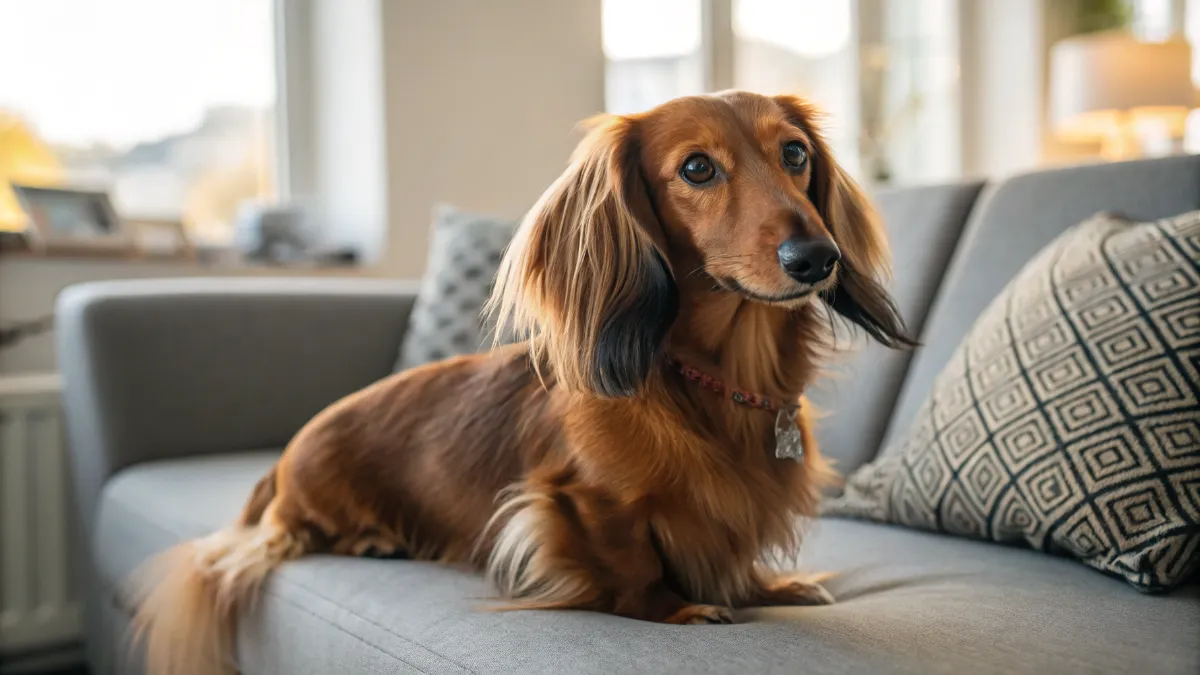Let’s cut to the chase – long-haired dachshunds are having a moment in 2025, and it’s not just a random trend. These elegant pups with their flowing locks and sausage-shaped bodies are climbing the popularity charts faster than you can say “wiener dog.”
- The Numbers Don’t Lie: Dachshund Popularity in 2025
- The Long-Haired Dachshund: A Quick History Lesson
- Why Long-Haired Dachshunds Are Taking Over in 2025
- Table: Long-Haired Dachshund vs. Other Popular Small Breeds
- Real Talk: What Living With a Long-Haired Dachshund is Actually Like
- Feeding Your Long-Haired Dachshund: What Works Best
- Table: Long-Haired Dachshund Diet Essentials
- The Future of Long-Haired Dachshund Popularity
- Is a Long-Haired Dachshund Right for You?
- The Bottom Line on Long-Haired Dachshund Popularity in 2025
- FAQs Related to Long-Haired Dachshunds
After keeping one for a year myself, I get the hype. There’s something about that combination of aristocratic good looks and goofy personality that just hits different. And I’m not alone – these little dogs with big character are becoming the go-to choice for new pet parents across America.
But what’s behind this sudden surge in long-haired dachshund popularity in 2025? Let’s break down why these sophisticated-yet-silly pups are capturing hearts nationwide.
The Numbers Don’t Lie: Dachshund Popularity in 2025
The pet industry is booming right now. According to the latest data, pet ownership has expanded to a whopping 94 million U.S. households – that’s up from 82 million just two years ago. And where are people spending their pet dollars? Well, the industry hit $152 billion in 2024 and is on track for $157 billion this year.

Within this growing market, dachshunds continue to hold their ground. The American Kennel Club currently ranks them as the 12th most popular dog breed worldwide, but all signs point to them climbing higher. While exact stats don’t separate the coat varieties, breeders consistently report that demand for the long-haired version is surging.
What’s interesting is who’s driving this trend. Gen Z is leading the charge in pet ownership growth – 18.8 million Gen Z households owned pets in 2024, which was a 43.5% jump from the previous year. And they’re not stopping at one pet either; about 70% of Gen Z pet owners have multiple furry friends at home.
The Long-Haired Dachshund: A Quick History Lesson
Before we get deeper into why these dogs are trending, let’s take a quick look at where they came from. The dachshund’s story starts in 15th century Germany, where they were hunting dogs designed to chase badgers, foxes, and rabbits into their burrows. That long, low body wasn’t just for looks – it was perfect for digging into tunnels and navigating underground.
The name itself tells the story: “Dachs” means badger and “hund” means dog in German. But the original dachshunds had short, smooth coats.
So where did those gorgeous locks come from? The long-haired variety was created through careful breeding, likely with spaniels in the mix. The goal was practical: create a dachshund that could handle colder weather while still maintaining its hunting skills. By the 19th century, these flowing-coated beauties had caught the eye of European aristocrats and became status symbols among noble families.
Why Long-Haired Dachshunds Are Taking Over in 2025
The Instagram Factor: Made for Social Media
Let’s be real – these dogs are ridiculously photogenic. That combination of the iconic elongated body with a flowing, silky coat makes for prime social media content. Even Picasso couldn’t resist their unique silhouette and expressive personality.
In our social media-driven world, having a pet that photographs well is practically a requirement, and long-haired dachshunds deliver every time. Their distinctive look stands out in a feed full of generic cute pets, and their expressive faces make for endless content possibilities.
After a year with my own long-haired dachshund, my camera roll is about 80% dog photos. They just have this way of striking naturally photogenic poses without even trying.
Apartment-Friendly Yet Full of Character
One major reason for the rising long-haired dachshund popularity in 2025 is how well they fit modern living situations. Despite their hunting heritage, these dogs have adapted beautifully to contemporary life.
Their compact size makes them perfect for apartments or smaller homes, addressing a huge need for urban dwellers. But unlike some small breeds that feel like accessories, long-haired dachshunds pack major personality into their mini frames. They’re the perfect combination of manageable size and memorable character.
From my experience, they’re perfectly content in smaller spaces as long as they get their daily walks and play sessions. My dachshund has turned our modest apartment into his kingdom without ever feeling cramped.
The Perfect Second (or Third) Pet
As younger generations increasingly adopt multiple pets, long-haired dachshunds tick all the boxes for multi-pet households. Their moderate size and generally sociable nature make them great companions not just for humans but for other animals too.
With 70% of Gen Z pet owners reporting multiple pets at home, breeds that play well with others are in high demand. Long-haired dachshunds, with their adaptable personalities, fit perfectly into this growing trend.
When I brought my cat home, my dachshund was curious but respectful. After the initial adjustment period, they now nap together on the couch – proving these dogs can thrive in multi-pet settings.
Table: Long-Haired Dachshund vs. Other Popular Small Breeds
| Characteristic | Long-Haired Dachshund | French Bulldog | Shih Tzu | Pomeranian |
|---|---|---|---|---|
| Size | Small (16-32 lbs) | Small (16-28 lbs) | Small (9-16 lbs) | Small (3-7 lbs) |
| Coat Care | Moderate (3-4x weekly brushing) | Low | High | High |
| Exercise Needs | Moderate | Low | Low | Moderate |
| Apartment Friendly | Very Good | Excellent | Excellent | Good |
| Multi-Pet Compatibility | Good | Moderate | Good | Moderate |
| Distinctive Look | Very High | Very High | High | High |
| Social Media Appeal | Excellent | Excellent | Good | Very Good |
| Training Ease | Moderate | Challenging | Challenging | Moderate |
Real Talk: What Living With a Long-Haired Dachshund is Actually Like
After keeping one for a year, I can tell you that living with a long-haired dachshund is like having a small, opinionated roommate who happens to be covered in silky fur. Here’s the unfiltered truth:
Their Personality: Big Dog Energy in a Small Package
These dogs don’t know they’re small, and they’ll never let you forget it. Mine regularly tries to boss around dogs triple his size at the park, then looks genuinely surprised when they don’t immediately submit to his authority.
They’re fiercely loyal, sometimes to a fault. My dachshund follows me from room to room like we’re connected by an invisible tether. Bathroom privacy? That concept no longer exists in my home.
The breed’s hunting background shows up in unexpected ways. Mine will spend hours tracking an invisible scent around the apartment or digging into blankets like he’s pursuing some elusive underground prey. It’s both amusing and slightly concerning when he emerges victorious with a sock he’s “captured.”
The Coat: Gorgeous but Demanding
Let’s talk about that signature flowing coat. Yes, it’s beautiful. Yes, it turns heads at the dog park. And yes, it requires consistent upkeep.
You’ll need to brush your long-haired dachshund 3-4 times a week to prevent mats and tangles. A pin brush or slicker brush works best for maintaining that silky texture. This isn’t just about looks—proper coat care is essential for skin health too.
The upside? That grooming time becomes bonding time. My dachshund now sees the brush as a sign of attention and will actually come running when I take it out.
Health Watch: Protecting That Long Spine
The most important thing to know about dachshunds is that their unique body shape comes with health considerations. That long spine makes them prone to back problems, particularly intervertebral disc disease.
This means you need to be vigilant about a few things:
- Keeping their weight in check (those begging eyes are hard to resist, but extra pounds put dangerous pressure on their spine)
- Preventing jumping from heights (no couch jumping allowed in my house)
- Using ramps or stairs for furniture they’re allowed on
- Picking them up properly (supporting both ends of that long body)
The Training Challenge: Smart But Stubborn
Long-haired dachshunds are whip-smart, which is both a blessing and a curse when it comes to training. They pick up concepts quickly but then decide whether they feel like complying.
Consistency is key. My dachshund figured out “sit” in about three minutes flat but took weeks to decide he would do it when asked. Food motivation helps—these dogs will usually perform for treats when nothing else works.
Feeding Your Long-Haired Dachshund: What Works Best
Proper nutrition is critical for these unique dogs, especially given their predisposition to back problems. After a year of trial and error, here’s what I’ve learned works best:
- Look for high-quality small breed dog food with real meat as the primary ingredient
- Foods with omega-3 fatty acids (like fish oil) promote that gorgeous coat health
- Glucosamine supplements support joint health
- Controlled portions are non-negotiable to prevent weight gain
Remember that a healthy diet isn’t just about what goes in the bowl—it’s about what doesn’t. Those pleading eyes when you’re eating will test your resolve, but staying firm about table scraps is essential for their health.
Table: Long-Haired Dachshund Diet Essentials
| Nutrient | Benefit | Food Sources |
|---|---|---|
| High-Quality Protein | Muscle development | Chicken, turkey, beef as first ingredient |
| Omega-3 Fatty Acids | Coat and skin health | Fish oil, flaxseed |
| Glucosamine & Chondroitin | Joint and spine support | Supplements, specialized foods |
| Calcium & Phosphorus | Bone strength | Dairy-derived ingredients, balanced formulas |
| Controlled Calories | Weight management | Portion control, avoid overfeeding |
The Future of Long-Haired Dachshund Popularity
All signs point to continued growth in long-haired dachshund popularity in 2025 and beyond. Their combination of distinctive looks, adaptable size, and engaging personality perfectly aligns with what modern pet owners want.
As Pete Scott, president and CEO of the American Pet Products Association noted, current trends “reaffirm that pet care remains a top priority for Americans, reflecting the deep and lasting bond between people and their pets.” The long-haired dachshund, with its aristocratic appearance and devoted nature, perfectly embodies this connection.
The breed benefits from both historical pedigree and modern appeal—a powerful combination in today’s market. As more young pet owners discover these charming dogs, expect to see even more flowing locks at dog parks nationwide.
Is a Long-Haired Dachshund Right for You?
Before you jump on the trend, ask yourself these questions:
- Can you commit to regular grooming sessions?
- Are you prepared to manage their health needs, particularly back health?
- Do you have the patience for training a smart but sometimes stubborn dog?
- Is your living situation suitable for a small but active dog?
If you answered yes to these questions, you might be ready to join the growing ranks of long-haired dachshund owners. Just be prepared for lots of comments from strangers asking about your dog’s gorgeous coat!
The Bottom Line on Long-Haired Dachshund Popularity in 2025
The surge in long-haired dachshund popularity isn’t just another passing pet trend. It represents the perfect meeting point between historical breed qualities and modern ownership preferences. Their unique appearance, adaptable nature, and engaging personality create an irresistible package for today’s pet owners.
With pet ownership expanding to 94 million U.S. households and younger generations driving multi-pet ownership trends, the long-haired dachshund’s position in the market looks increasingly secure. Their ability to thrive in various living situations while maintaining their distinctive character makes them ideally suited to current trends.
After a year with mine, I get it. There’s something special about these dogs that transcends their trendiness. They’re equal parts elegant and goofy, aristocratic and down-to-earth. They’ll test your patience one minute and melt your heart the next.
For those willing to meet their specific care needs, the long-haired dachshund offers that rare combination of standout looks and substance—a dog that turns heads while also becoming a beloved family member. In a world where style often comes at the expense of substance, these dogs deliver both—and that’s why their star continues to rise in 2025.
So if you’re considering joining the long-haired dachshund club, welcome aboard. Just be warned: one is rarely enough, and you might soon find yourself contributing to those multi-pet household statistics!
FAQs Related to Long-Haired Dachshunds
How much grooming do long-haired dachshunds need?
Long-haired dachshunds need brushing 3-4 times weekly to prevent mats and tangles in their silky coats. A pin brush or slicker brush works best. They don’t need professional grooming as frequently as some breeds, but regular at-home maintenance is essential for coat health and to minimize shedding around your home.
Are long-haired dachshunds good apartment dogs?
Yes, long-haired dachshunds are excellent apartment dogs due to their small size and adaptable nature. They don’t require enormous spaces but do need daily walks and mental stimulation. Their moderate energy levels make them suitable for city living, though they’ll appreciate having furniture they can climb onto safely (using ramps).
Do long-haired dachshunds have health issues I should be concerned about?
The main health concern with any dachshund is their elongated spine, which makes them prone to intervertebral disc disease (IVDD). To minimize risks, maintain a healthy weight, prevent jumping from heights, use ramps for furniture, and lift them properly by supporting both ends of their body. Regular vet check-ups are also important.
Are long-haired dachshunds good with children and other pets?
Long-haired dachshunds can do well with children and other pets, especially when socialized from a young age. They tend to have a slightly mellower temperament than their smooth-coated siblings. However, their hunting background means they may chase smaller pets, and their backs need protection from rough handling by young children.
How much exercise do long-haired dachshunds require daily?
Long-haired dachshunds need moderate exercise – typically 30-45 minutes of activity daily, which can be split between walks and play sessions. Mental stimulation through games and training is equally important. While they enjoy exercise, be careful not to overdo it as their unique body structure requires balanced activity that strengthens supporting muscles without straining their spine.












